This book questions the simplistic view that convenience food is unhealthy and environmentally unsustainable. By exploring how various types of convenience food have become embedded in consumers’ lives, it considers what lessons can be learnt from the commercial success of convenience food for those who seek to promote healthier and more sustainable diets. The project draws on original findings from comparative research in the UK, Denmark, Germany and Sweden (funded through the ERA-Net Sustainable Food programme).
Reframing Convenience Food avoids moral judgments about convenience food, and instead provides a refreshingly novel perspective guided by an understanding of everyday consumer practice. It will appeal to those with an interest in the sociology and politics behind health, consumerism, sustainability and society.
Inhaltsverzeichnis
1. Introduction.- 2. A Short History of Convenience Food.- 3. Convenience Food as a Contested Category.- 4. The Normalization of Convenience Food.- 5. The Temporalities of Convenience Food.- 6. The Spatialities of Convenience Food.- 7. The Moralization of Convenience Food.- 8. Cooking and Convenience.- 9. Convenience, Health and Sustainability.- 10. Conclusions.
Über den Autor
Peter Jackson is Professor of Human Geography at the University of Sheffield, UK
Helene Brembeck is Professor of Ethnology at the University of Gothenburg, Sweden
Jonathan Everts is Professor of Human Geography at the University of Halle-Wittenberg, Germany
Maria Fuentes is Senior Researcher at the University of Gothenburg, Sweden
Bente Halkier is Professor of Sociology at the University of Copenhagen, Denmark
Frej Daniel Hertz is a Ph D student at Roskilde University, Denmark
Angela Meah is Research Fellow at the University of Sheffield, UK
Valerie Viehoff is completing a PGCE at University College London, UK
Christine Wenzl is a Ph D student at the University of Bonn, Germany












